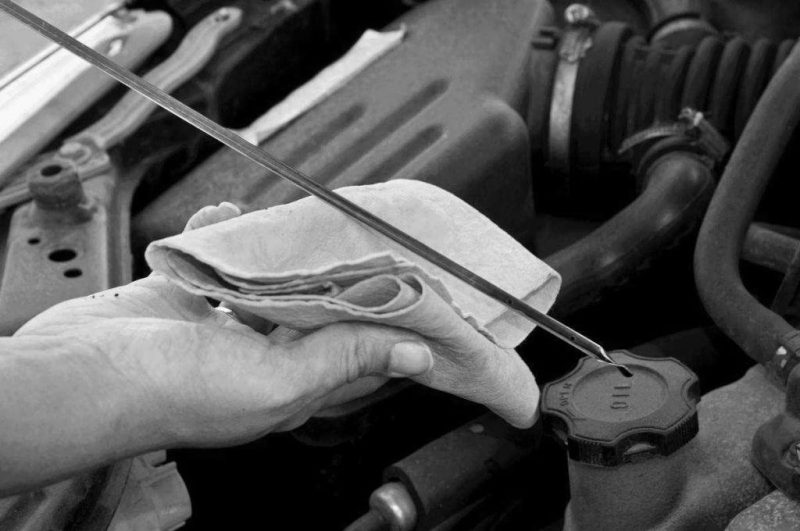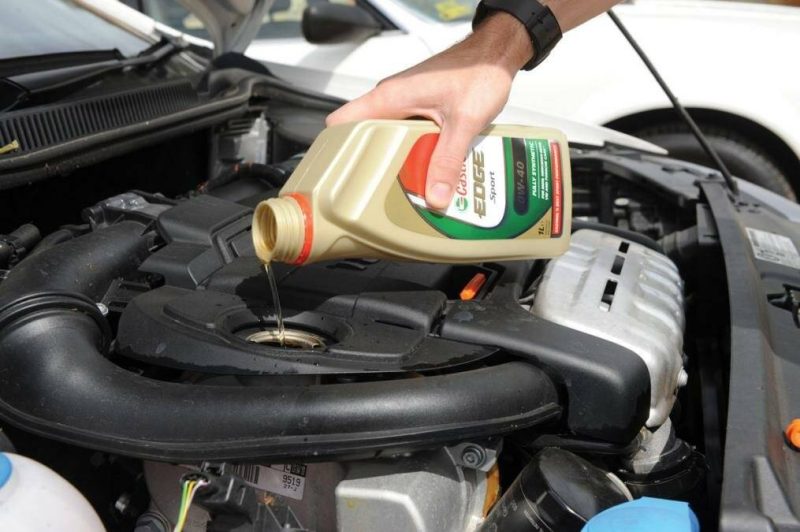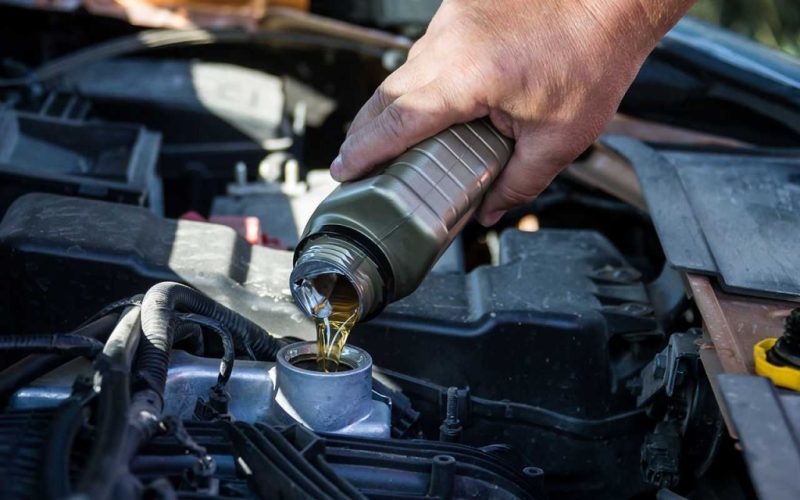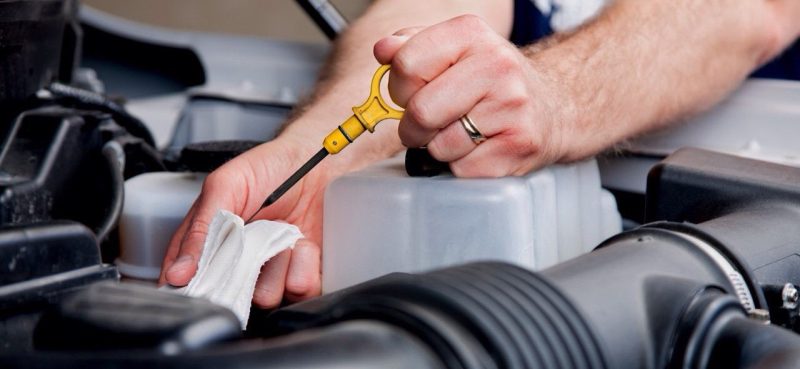The driver who does not regularly monitor the good condition of various mechanisms of the car, exposes a great danger not only to its normal operation, but also to his life. But, perhaps, the main issue of the proper functioning of the car is where does the oil go from the engine? We will slightly analyze why this is important, and what can be the causes of this problem.
When to sound the alarm
There are no exact norms for oil consumption, as in the case of fuel. Older auto models consume more oil than modern internal combustion engines. If in the first case this indicator is critical – half a liter per 1000 km, then for modernized cars this norm can be 1 liter for about 10 thousand km.
But, again, this is not the truth in the last instance. There are other factors, which we will consider below. But the main criterion is a sharp and constant drop in the oil level for several days.
But in order to “sound the alarm”, it is necessary to notice this problem. This is the main prevention of the accident. Auto mechanics advise checking the oil level before every trip. This is a well-established truth. The level is checked on a cold engine (in the process of driving, the oil warms up and increases in volume). And as a result, you will not get an accurate indicator.
In this case, if you notice a decrease in the level, it is not enough to simply refill the lubricant, it is desirable to try to understand why the oil in the engine goes away. In the article you will get tips on how to make the correct “diagnosis”.
Oil consumption provided by the technical characteristics
It is common knowledge that any liquid has the property to evaporate. Faster or slower, it’s a different question. This process is accelerated at high temperatures, which are characteristic of engine operation. With normal engine operation, oil consumption should be minimal. At the same time, different makes and models of cars can consume different amounts of it. If you do not have to constantly carry a canister of oil, and refill it not every day, but once a week, you should not worry.
Oil quality
Oil consumption depends to a large extent on the viscosity and quality of the oil. If everything is more or less clear with viscosity, the fatter the oil, the more it flows through various seals, the quality is a bit more complicated. The fact is that most car owners prefer to buy motor oil for their engine for “cheaper” reasons.

For an example, open the filler neck on the valve cover of your engine. What do you see inside? That’s right, black soot. Where does the soot come from? From the oil. Too high a temperature causes cheap engine oil to break down and deposit on the walls. Oil carbon monoxide occurs and its level in the engine crankcase decreases. This in turn, among other negative consequences, leads to a decrease in the oil level in the engine, which again has a bad effect on its ability to cool in the crankcase sump. So, there’s more engine oil overheating in the future. The longevity of the engine with such (cheap) engine oil, alas, is expected to be very low.
So, the first disadvantage of bad oil is that it is destroyed by high temperature and actually ceases to be oil. That high quality product that manufacturers recommend.
The second disadvantage of low-grade oils is that they, breaking down, their decomposition products (soot) contaminate the engine. As a result, piston rings because of this soot barely move in their grooves, and should “play”, continuously tracking, alas, no longer ideal, the profile of the cylinder. The result – lodging (corking) piston rings. And first, as follows from practice, the oil rings will stop moving. As a result, unremoved oil will remain on the cylinder walls and will be burned. A car with a gasoline engine will smoke a bluish smoke. A diesel car will not. All the oil not removed in a diesel engine will burn without any smoke. The most curious thing is that if you measure the compression at this defect (oil rings sticking), the results will be excellent. The oil not removed from the cylinder walls will seal the gaps in the compression rings, and the gauge will show even better pressure than a new engine.
And the third thing that the use of low grade oils will lead to is the destruction of all the “rubbers”. After overheating, the rubber of all oil seals, glands, oil caps will lose its elasticity and turn into a kind of plastic. Naturally, after that there will be oil leakage. And all these problems arise from the desire to win something on the maintenance of your iron friend, buying him cheaper oil.
Let’s consider other reasons that cause a decrease in the oil level in the engine. The most common is a banal leak. Some problems can be eliminated on their own, and with certain problems without a good specialist can not cope. First, let’s analyze what can be done on your own. If we talk about leaks, then you should pay attention to the engine seals. Details – below.
“Simple” causes of oil consumption
Checked simply. We remove the valve cover and look. If everything under it is black, with thick deposits of fuel oil on all parts, it means that oil consumption is largely caused by its loss. Second option. If in a week after oil change, it became black again (we are not talking about diesels, where blackening of engine oil does not speak about anything), then one of two things: either the engine is terribly dirty and the new oil successfully dissolves this dirt in itself, or the new oil is intensively destroyed and, of course, dwindles, intensively polluting itself with the products of its carbon monoxide. By the way, this is a very common cause of engine failure.
Oil can leak through the cylinder block gasket
This situation occurs if the power bolts are unevenly tightened during engine assembly. As a result, the gasket can deform, and not provide a tight fit of the parts. Clear evidence of this problem will be sweat on the engine, which is not difficult to determine visually. It is enough to look under the hood and the fact of the problem is obvious. In this case, it is important to take into account that a drop in oil level is one part of the problem. A much more serious one is the possibility in this case of getting the fuel inside the cylinders. Here you can already “lose” the engine. Therefore, it is necessary not only to replace the gasket, but also to make sure that the coolant has not gotten into the cylinders. There is doubt to the contrary – you need to replace the oil completely.
Crankshaft oil seals are another “go to” for leaking oil

It is not difficult to determine the leakage on the oil seals. If an oil puddle has formed under the car during parking, there is a high probability that the edges of the oil seals, designed for sealing, have fallen into disrepair (loosened, erased). This is a fairly common problem as rubber is not durable in itself. One of the reasons may also be the impact of low-quality oil. Therefore, it is necessary to purchase only modern oil seals, adapted to work in extreme conditions. It is not difficult to solve this problem, it is enough to replace worn oil seals with new ones and the question of where the oil goes from the engine will fall away by itself.
Oil can go away through the oil filter gaskets
This unpleasant situation arises as a result of a hasty or inept replacement of the filter. To be more clear: the filter or not screwed, which excludes tightness or the gasket is wrinkled and the result is the same. In the first case it is necessary to screw the filter more tightly. In the second case – to see if the gasket is in normal condition, if not, replace it, but be sure to lubricate it with machine oil. This ensures its elasticity on the one hand and uniformity of fit on the other.
Oil-reflective caps (they are oil-removing, they are also valve seals)
These parts are located in the upper part of the cylinder head. And as a result, they are exposed to particularly high temperatures. If we take into account that they are made of rubber (even if high-strength and heat-resistant), but it is rubber, and it will not be able to withstand critical temperatures for a long time. Caps by their properties begin to resemble plastic and do not fulfill their functions. As a result, oil begins to leak, covering the exhaust valves with organic deposits. Another variant of leakage is a defective cap, the effect is the same. In this case, only replacing the caps will help. For fans of fast starts, a special warning – constant extreme driving can “rip” it out of place (if it was not properly installed).
“Complicated” causes of oil consumption
Piston ring oxidation
A far more unpleasant and difficult to eliminate cause of lower oil levels is coking of the piston rings. Piston rings perform their functions well only when they are clean. This gives them excellent mobility. If they are caked and sealed, sealing is out of the question. In this case, a decrease in compression of one or more cylinders is noticed. It is impossible not to notice this in the work of the engine. There are several reasons for this phenomenon: low-quality and “old” oil. In this case, you can try to do without major repairs. There are special means (chemistry that can dissolve the plaque), with which it is necessary to treat the rings. And of course, a complete oil change will be required.
Cylinder wear
High cylinder wear has a greater impact on oil consumption than the previously discussed piston ring problems. Boring can solve the problem in some cases. But there are also “hidden” to a certain point violations of integrity – these are microcracks, small chips. They are figuratively “filled” with oil and this leads to a small but daily decrease in the level, which becomes clearly noticeable after a week and even more so after a month.
Cylinder Deformation
Another rather specific problem associated with the design features of cylinders is their deformation. When installing anchor studs, peculiar distortions occur, which affect the installation and operation of the sealing rings. In fact, the latter cannot provide a sufficiently tight fit due to “sickle-shaped gaps”. The use of relatively soft rings can help. But again, it will “eat” more oil.
Lubricating piston rings
These engine elements are designed to ensure the flow of the normal amount of oil to the compression rings. And as a result, they do not have permanent lubrication, that is, they are not “bathed” in oil, as some parts. Friction is then increased and more rapid wear occurs. There is no metal that can exist forever. This applies to these car parts as well. High oil consumption shows that the piston rings have worn off significantly. Do not try to solve this problem on your own. Here, without a service station, you can only “break wood”.
Oil can also escape through the piston rings

This problem occurs as a result of overheating. There are critical temperatures at which the piston rings well retain their elasticity and perfectly fulfill the functions assigned to them. This range is defined from 180 to 200 degrees. A small “plus” is allowed, since all parts are created with an additional margin of safety. But at the same time, even a single significant increase in the operating temperature of the engine can lead to a decrease in the function of piston rings, and as a result, increased oil consumption. A good motorist, service station, car service will help. In general, you should not engage in “self-medication”.
Intervalve jumpers
This is one of the so-called defects of heat fatigue. In this case, in addition to the wear of the pistons, there is an additional violation of the combustion chamber, it loses the necessary seal. As in the previous case, contact only specialists.
Specific causes?
We want to note several points that are not related to the design features of the car. And what is more important, you can affect them without having the knowledge of an auto locksmith.
Extreme driving
Fans of fast starts, sharp braking, driving at the limits of the capabilities of the car in general and the engine in particular, should realize that this can not but affect the engine. Pistons work with heavy loads, the temperature rises, you can remember and revise the previous subheadings and the description of the problems associated with this. So two options for dealing with this issue. Travel in normal mode, provided by the performance characteristics of the machine. Or an additional canister of oil in the trunk and “een” amount of money for repairs.
Late combustion provokes an increase in oil consumption
This is due to the fact that the engine temperature rises with all the consequences that follow. In this case, it is necessary to adjust the ignition and use quality fuel with an octane number that corresponds to the model of your car.
Lubrication of the turbocharger
This is, in principle, a natural loss, which is difficult to influence. But as a rule, such consumption is associated with expensive brands with a turbo engine.
Poor quality oil

The higher the viscosity, the better the lubrication. With this, everything is kind of clear. But in doing so, it creates additional carbon monoxide in the pistons. And here comes the fork: to increase the resource of the engine or oil consumption. Undeniable is the fact that it is necessary to buy licensed oil from well-known manufacturers and at least somehow protect yourself.
Briefly. Increased oil consumption in the engine: causes and solutions
| Cause | Description | Solution |
|---|---|---|
| Oil quality | Poor quality or cheap oil breaks down at high temperatures, resulting in fouling and lower oil levels. | Use high quality oil. |
| Leakage through the gasket | The cylinder block gasket can warp, causing oil leakage. | Replace the gasket and check for coolant in the cylinders. |
| Crankshaft oil seals | Worn or damaged oil seals cause oil leaks. | Replace the oil seals. |
| Incorrect oil filter replacement | The filter gasket may be damaged or improperly installed, causing leaks. | Check the condition of the gasket and screw the filter on tightly. |
| Oil caps | Worn oil caps lose elasticity and no longer perform their function. | Replacing the caps. |
| Coking of piston rings | Contamination of piston rings reduces their mobility, which leads to oil leakage. | Use chemicals to clean the rings and change the oil. |
| Cylinder wear | Worn or deformed cylinders can cause oil leaks. | Bore cylinders or replace parts. |
| Overheating of piston rings | Overheating reduces the elasticity of the rings, resulting in increased oil consumption. | Professional diagnosis and repair. |
| Intervalve jumpers | Combustion chamber seal failure due to jumper wear. | Refer to specialists to eliminate the defect. |
| Extreme driving | Continuous high engine load causes increased oil consumption. | Moderate engine operation. |
| Late combustion | Late combustion increases engine temperature and oil consumption. | Adjust ignition and use fuel with the correct octane rating. |
| Turbocharger | Turbocharged engines can consume more oil due to turbine lubrication. | Consider normal oil consumption in turbocharged engines. |
Is there a normal oil consumption rate?
No as such an exact figure does not exist. But if a month ago you did not have such a misfortune, and at present it becomes quite obvious, then the matter is not in the design features of the car.
At the same time, a sufficient amount of oil will avoid serious engine breakdowns. We have considered the reasons that allow you to understand where the oil goes from the engine, this will help you to follow the correct operation and avoid serious spending on repair work.
